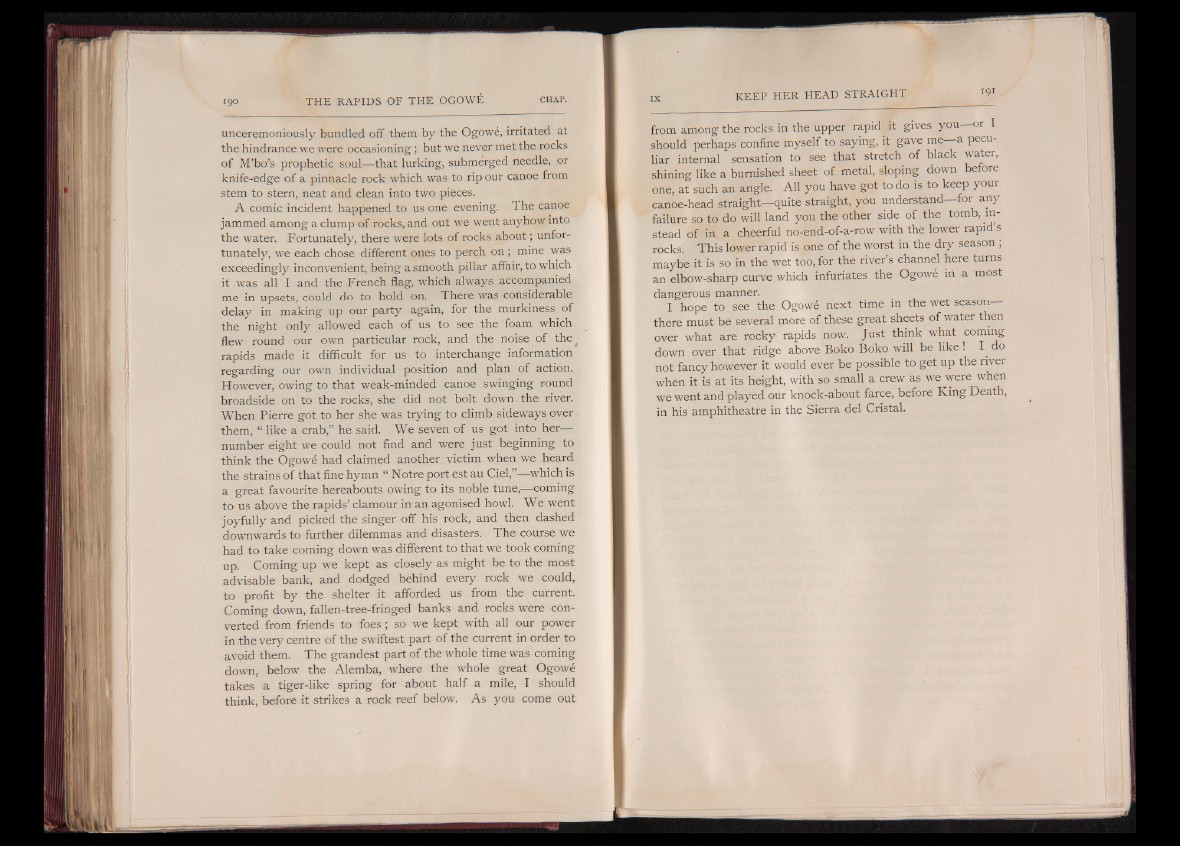
unceremoniously bundled off them by the Ogowe, irritated at
the hindrance we were occasioning ; but we never met the rocks
of M’bo’s prophetic soul— that lurking, submerged needle, or
knife-edge of a pinnacle rock which was to rip our canoe from
stem to stern, neat and clean into two pieces.
A comic incident happened to us one evening. The canoe
jammed among a clump of rocks, and out we went anyhow into
the water. Fortunately, there were lots of rocks about; unfortunately,
we each chose different ones to perch on ; mine was
exceedingly inconvenient, being a smooth pillar affair, to which
it was all I and the French flag, which always accompanied
me in upsets, could do to hold on. There was considerable
delay in making up our party again, for the murkiness of
the night only allowed each of us to see the foam which
flew round our own particular rock, and the noise of the (
rapids made it difficult for us - to interchange information
regarding our own individual position and plan of action.
However, owing to that weak-minded canoe swinging round
broadside on to the rocks, she did not bolt down the river.
When Pierre got to her she was trying to climb sideways over
them, | like a crab,” he said. We seven of us got into her—
number eight we could not find and were just beginning to
think the Ogowe had claimed another victim when we heard
the strains of that fine hymn “ Notre port est au Ciel,”— which is
a great favourite hereabouts owing to its noble tune,— coming
to us above the rapids’ clamour in an agonised howl. We went
joyfully and picked the singer off his rock, and then dashed
downwards to further dilemmas and disasters. The course we
had to take coming down was different to that we took coming
up. Coming up we kept as closely as might be to the most
advisable bank, and dodged behind every rock we could,
to profit by the shelter it afforded us from the current.
Coming down, fallen-tree-fringed banks and rocks were converted
from friends to foes; so we kept with all our power
in the very centre of the swiftest part of the current in order to
avoid them. The grandest part of the whole time was coming
down, below the Alemba, where the whole great Ogow<£
takes a tiger-like spring for about half a mile, I should
think, before it strikes a rock reef below. As you come out
from among the rocks in the upper rapid it gives you or I
should perhaps confine myself to saying, it gave me— a peculiar
internal sensation to see that stretch of black water,
shining like a burnished sheet of metal, sloping down before
one, at such an angle. All you have got to do is to keep your
canoe-head straight— quite straight, you understand— for any
failure so to do will land you the other side of the tomb, instead
of in a cheerful no-end-of-a-row with the lower rapid s
rocks. This lower rapid is one of the worst in the dry season ,
maybe it is so in the wet too, for the river’s channel here turns
an elbow-sharp curve which infuriates the Ogow6 in a most
dangerous manner.
I hope to see the Ogow£ next time in the wet season—
there must be several more of these great sheets of water then
over what are rocky rapids now. Just think what coming
down over that ridge above Boko Boko will be like ! I do
not fancy however it would ever be possible to get up the river
when it is at its height, with so small a crew as we were when
we went and played our knock-about farce, before King Death,
in his amphitheatre in the Sierra del Cristal.